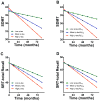CSF tau and tau/Aβ42 predict cognitive decline in Parkinson's disease
- PMID: 25596881
- PMCID: PMC4603566
- DOI: 10.1016/j.parkreldis.2014.12.027
CSF tau and tau/Aβ42 predict cognitive decline in Parkinson's disease
Abstract
Introduction: A substantial proportion of patients with Parkinson's disease (PD) have concomitant cognitive dysfunction. Identification of biomarker profiles that predict which PD patients have a greater likelihood for progression of cognitive symptoms is pressingly needed for future treatment and prevention approaches.
Methods: Subjects were drawn from the Deprenyl and Tocopherol Antioxidative Therapy of Parkinsonism (DATATOP) study, a large clinical trial that enrolled initially untreated PD patients. For the current study, Phase One encompassed trial baseline until just prior to levodopa administration (n = 403), and Phase Two spanned the initiation of levodopa treatment until the end of cognitive follow-up (n = 305). Correlations and linear mixed models were performed to determine cross-sectional and longitudinal associations between baseline amyloid β1-42 (Aβ42), total tau (t-tau), and phosphorylated tau (p-tau) in cerebrospinal fluid (CSF) and measures of memory and executive function. Analyses also considered APOE genotype and tremor- vs. rigidity-dominant phenotype.
Results: No association was found between baseline CSF biomarkers and cognitive test performance during Phase One. However, once levodopa treatment was initiated, higher p-tau and p-tau/Aβ42 predicted subsequent decline on cognitive tasks involving both memory and executive functions. The interactions between biomarkers and cognition decline did not appear to be influenced by levodopa dosage, APOE genotype or motor phenotype.
Conclusions: The current study has, for the first time, demonstrated the possible involvement of tau species, whose gene (MAPT) has been consistently linked to the risk of PD by genome-wide association studies, in the progression of cognitive symptoms in PD.
Keywords: Biomarkers; Cerebrospinal fluid; Cognition; Neuropsychological tests; Parkinson disease; tau proteins.
Copyright © 2015 Elsevier Ltd. All rights reserved.
Figures

References
-
- Alves G, Bronnick K, Aarsland D, Blennow K, Zetterberg H, et al. CSF amyloid-beta and tau proteins, and cognitive performance, in early and untreated Parkinson's disease: the Norwegian ParkWest study. J Neurol Neurosurg Psychiatry. 2010;81:1080–1086. - PubMed
-
- Mollenhauer B, Trenkwalder C, von Ahsen N, Bibl M, Steinacker P, et al. Beta-amlyoid 1–42 and tau-protein in cerebrospinal fluid of patients with Parkinson's disease dementia. Dement Geriatr Cogn Disord. 2006;22:200–208. - PubMed
-
- Compta Y, Marti MJ, Ibarretxe-Bilbao N, Junque C, Valldeoriola F, et al. Cerebrospinal tau, phospho-tau, and beta-amyloid and neuropsychological functions in Parkinson's disease. Mov Disord. 2009;24:2203–2210. - PubMed
Publication types
MeSH terms
Substances
Grants and funding
- ES016873/ES/NIEHS NIH HHS/United States
- AG033398/AG/NIA NIH HHS/United States
- R01 NS057567/NS/NINDS NIH HHS/United States
- P30 AG010124/AG/NIA NIH HHS/United States
- NS082137/NS/NINDS NIH HHS/United States
- P42 ES004696/ES/NIEHS NIH HHS/United States
- AG10124/AG/NIA NIH HHS/United States
- ES007033-6364/ES/NIEHS NIH HHS/United States
- NS057567/NS/NINDS NIH HHS/United States
- R01 ES019277/ES/NIEHS NIH HHS/United States
- R01 ES016873/ES/NIEHS NIH HHS/United States
- P30 ES007033/ES/NIEHS NIH HHS/United States
- ES019277/ES/NIEHS NIH HHS/United States
- P50 NS062684/NS/NINDS NIH HHS/United States
- R01 AG033398/AG/NIA NIH HHS/United States
- ES004696-5897/ES/NIEHS NIH HHS/United States
- U01 NS082137/NS/NINDS NIH HHS/United States
- NS062684-6221/NS/NINDS NIH HHS/United States
LinkOut - more resources
Full Text Sources
Other Literature Sources
Medical
Miscellaneous

